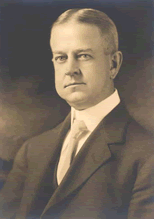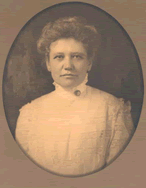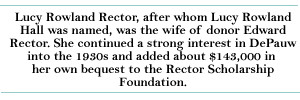
<<
Back
Among
the most generous benefactors of DePauw University were Edward and
Lucy Rowland Rector. The wealthy, refined, childless couple virtually
adopted the university-faculty, students, administration-as part
of the family and lavished upon it the gifts which made possible
a financial resurgence in the 1920s.
____________________________________
Edward
Rector, trustee from 1916 to his death in 1924, founded the Rector
Scholarship Foundation and was the donor of Rector Hall, Lucy
Rowland Hall, and Longden Hall. He was a prominent Chicago
patent lawyer.
_________________________________________
Born in Bedford, Ind. in 1863, Edward Rector worked at odd jobs
after leaving school in his teens when his father suffered financial
reverses. In 1882 he moved to Cincinnati, where he clerked in a
law office while attending law classes. He graduated from the University
of Cincinnati Law School in 1885 and began a career as a patent
attorney, first in Cincinnati and then in Chicago. Through his friendship
with another Chicago lawyer, DePauw alumnus and trustee Roy O. West,
Rector became acquainted with DePauw President George R. Grose and
took an immediate interest in the affairs of the Greencastle institution.
He was named to the board of trustees in 1916 and played a large
part in the capital fund campaign initiated that year.
 
While dining with President Grose in New York at the time of the
General Conference of the Methodist Episcopal Church in the summer
of 1916, Rector, a devout Methodist layman, is reported to have
asked his companion what facilities DePauw University most needed.
When Grose replied immediately, "a women's dormitory,"
the Chicago attorney pledged his personal gift of $100,000 to construct
one. Rector Hall was completed in 1917 and was named for the donor's
father, Isaac Rector, who had served as a trustee of the university
in the late 1860s when coeducation was introduced. Two years later
came the creation of the Rector Scholarship Foundation to provide
scholarships at DePauw for 100 of the brightest male graduates of
Indiana high schools each year. Until his death in 1925 Edward Rector
visited the campus frequently and kept in touch by correspondence
with many of the Rector Scholars, whose hometowns he marked on a
large map of Indiana in his Chicago law office. His gifts to the
university, as he explained to his fellow trustees, were "investments
in humanity, in the men and women who are to carry out the work
of our country and of the world when you and I are gone."
In his will Rector left a considerable part of his fortune to DePauw,
the bulk of it to finance the scholarship program. He also provided
$500,000 to construct two additional dormitories, one for men and
one for women. The first, Longden Hall, named for Professor Henry
B. Longden, was constructed in 1927. The second, Lucy Rowland
Hall, was completed in 1928 and named in honor of Rector's widow,
who carried on her husband's interest in DePauw for many years until
her own death in 1949. Altogether, by lifetime gifts and bequests,
Edward and Lucy Rector contributed a total of more than $3.8 million
to DePauw.
Back
to Top
<<
Back
|




